
The Business of Fashion
Agenda-setting intelligence, analysis and advice for the global fashion community.

Agenda-setting intelligence, analysis and advice for the global fashion community.
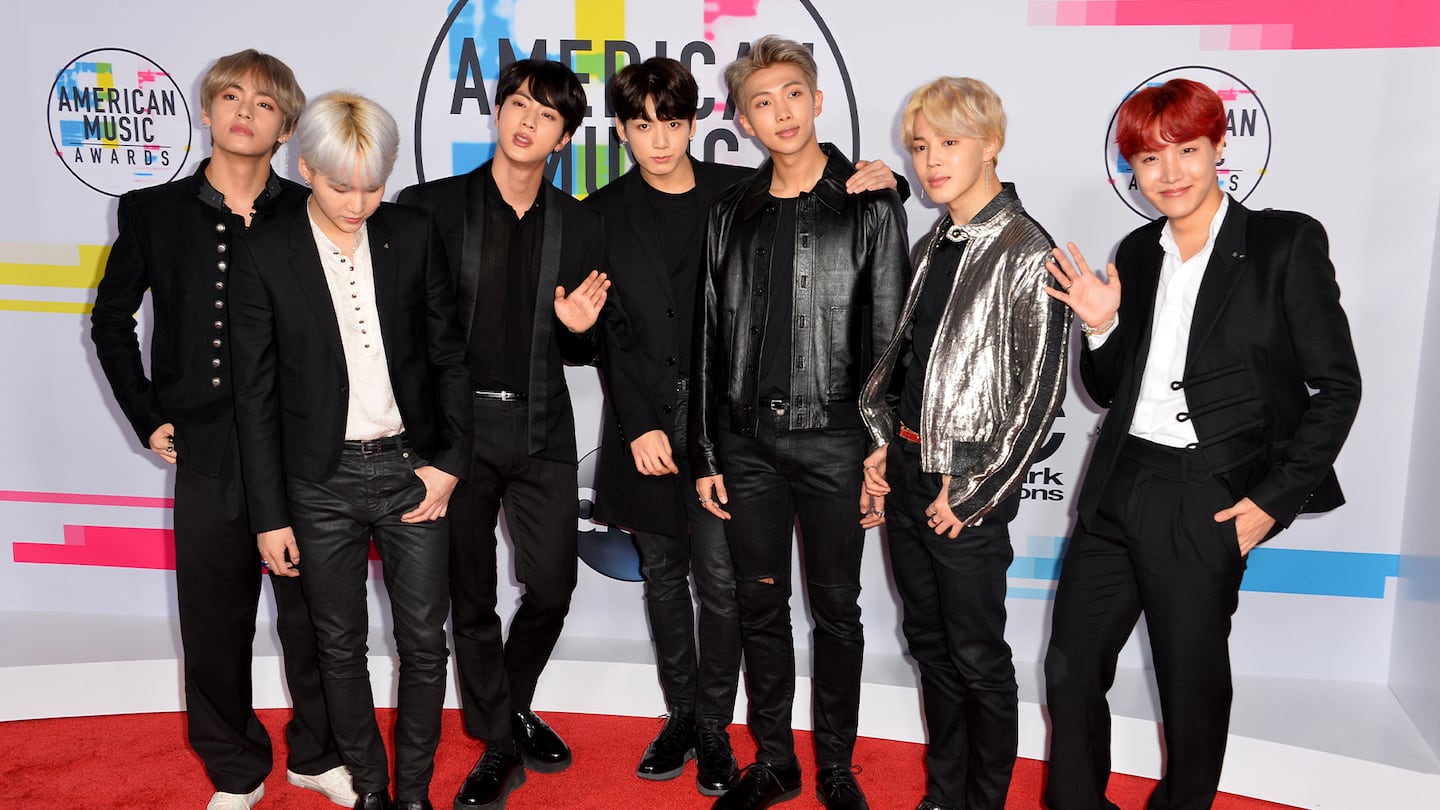
To many, Louis Vuitton’s decision to sign K-pop superstars BTS as global brand ambassadors earlier this year sounded as straightforward as it did potentially lucrative.
Not only are they an incredibly bankable group of seven stylish, fresh-faced band members with a passionate army of young international fans; they are also wildly popular in the luxury industry’s biggest market, China, where South Korean celebrities have long acted as a conduit for cool, influencing beauty standards and the way people dress. But even these seemingly squeaky-clean celebrities have now found themselves in hot water in China.
BTS’s unofficial banning in China started last year when the band’s leader, Kim Nam-joon, better known as RM, mentioned in a speech South Korea’s shared “history of pain” with the US over the Korean War, in which the two countries fought together. His remarks provoked anger in China, a country that fought on the other side of that conflict.
Then, last month, ten BTS fan group accounts, some of which had over a million followers, were banned from Chinese social media platform Sina Weibo for a period of 30 days, ostensibly as part of the Cyberspace Administration of China’s “Clear and Bright” campaign, which aims to combat the negative influence of “idol culture” and the “fan economy” on Chinese youth.
ADVERTISEMENT
The band members’ status as persona non grata was revealed most recently when the Friends reunion special aired in China, where the original sitcom enjoys huge popularity. The guest appearance of BTS on the TV show had been cut from the version shown to Chinese audiences. It’s unknown whether the censorship was an official government directive, or pre-emptively undertaken by local broadcasters to avoid angering the authorities.
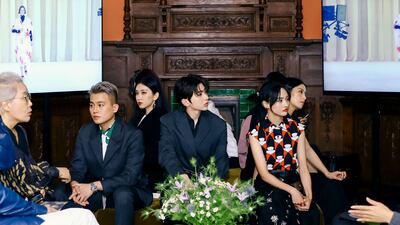
Incidents such as these, where brands’ celebrity ambassadors are caught up in a controversy linked to the Chinese authorities, the Chinese public or both, seem to be happening more frequently in a market where celebrities are a more powerful marketing tool than most.
According to Ruder Finn’s 2020 China Luxury Report, nearly 80 percent of mainland consumers surveyed said the importance of KOL (or key opinion leader, the local term for influencer) and celebrity endorsements are becoming increasingly important in their luxury spending decisions.
“Celebrities are extremely important when it comes to the hierarchy of influence that defines Chinese society, which is a prevalent dynamic in the Chinese consumer’s path to purchase,” explained Kim Lietzes, APAC managing director at Launchmetrics.
“[But] to get it right brands have to understand the needs and values of the local consumer to make sure that the voice resonates with the audience,” she added.
The complexity of the Chinese market — politically, culturally and geopolitically — means that consumers aren’t the only factor in the attendant risks of a celebrity partnership.
Ultimately, even if controversial celebrities remain popular with Chinese fans, their marketing value can be severely diminished if they fall foul of the Chinese authorities. For perceived infractions that would hardly make an impact in other international markets, some celebrities can fast become a brand liability.
Though marketing experts believe that BTS’s value to Louis Vuitton in China is still relatively high, some suggest that the brand might not be able to leverage their new signings as much as one might think – and that if the current ban escalates or another incident occurs, then things could deteriorate quickly. Louis Vuitton declined to comment about its plans and expectations for BTS in the China market.
ADVERTISEMENT
“They might say something that’s not politically correct, even if they don’t mean anything bad, if it’s not politically polished, that can backfire in China,” said Jason Yu, managing director for Greater China at Kantar Worldpanel.
A Volatile, Politically Charged Year
“I don’t think the controversy and the scrutiny is new, but I do think overall sensitivities have risen and an adverse reaction is far easier to provoke now than before,” said Michael Norris, senior analyst at Shanghai-based market research firm AgencyChina.
Overall sensitivities have risen and an adverse reaction is far easier to provoke now than before.
This is especially true given a recent rise in geopolitical tensions between China and the West about human rights in Xinjiang (an issue that has certainly impacted both brands and their celebrity partnerships); Hong Kong’s national security law and calls on both sides for investigations into how the Covid-19 outbreak first started.
All this is happening against the backdrop of the Chinese Communist Party celebrating the 100th anniversary of its founding this year, heightening the political lens through which a multitude of issues are perceived domestically, and a regulatory crackdown on both powerful tech companies and social media, with an emphasis on making both a force for positive socialist values.
For Jason Yu, the appointment of foreign celebrities, even incredibly popular East Asian stars, is fraught in the current climate.
“Brands have to be extremely careful to make sure [utilising Korean celebrities in the China market] doesn’t backfire. On the other hand, having Chinese celebrities in the current environment goes well with the rise of Chinese pride. That is a drastic change,” he said.
Indeed, the announcement in April from L’Oréal Paris that Korean actor Lee Jong-suk had been appointed ambassador specifically for the China market, caused many netizens in China to question why that position wouldn’t be reserved for someone Chinese, despite Lee’s significant popularity in China. L’Oréal quickly removed the “China” part of the actor’s title to diffuse the incident.
ADVERTISEMENT
As Norris points out, the trend is now for brands to drop the idea of “China ambassadors” and instead deploy a brigade of global ambassadors, one or more of whom happens to be Chinese. This is a step in the right direction, the next step will be further diffusion and differentiation of ambassadors across products lines and collections.
The received wisdom before was [to aim for] long engagements but, given some of the risks now, I’m not convinced that’s the right way going forward.
“The received wisdom before was [to aim for] long engagements but, given some of the risks now, I’m not convinced that’s the right way going forward,” he said. “Something short and sharp, something that works for a particular collection seems to fit the cultural zeitgeist and the search for novelty,” he added.
New Levels of Due Diligence
BTS fan groups are not the only ones to come under scrutiny as part of China’s battle against the “toxic” online culture that has emerged around idols and their young fans. The Chinese authorities are on a constant and long-running mission to make the media sphere a “positive” force, though there are no hard and fast rules about what this entails, leading to a broad range of interpretations of what constitutes “negative,” including celebrity fan clubs that engage in cyberbullying, visible tattoos and LGBTQ-related content.
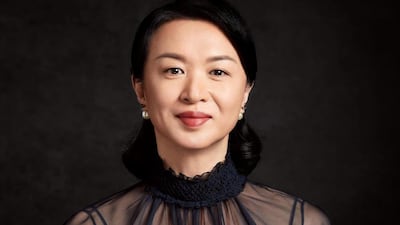
Indicative of the unpredictable nature of what is considered a positive influence, the recent announcement of 53-year-old transgender dancer and television host, Jin Xing as the face of a new Dior J’Adore campaign has received widespread praise online. Though China’s stance and engagement with LGBTQ issues is not at the same level of maturity as many other countries, Jin has a long history with the Chinese public and a reputation for excellence and professionalism. She has also become known as a wife and mother, all of which are seen as positive influences.
Newly minted Tod’s brand ambassador, Xiao Zhan, on the other hand, is a more traditional brand ambassador (by China standards), a xiao xian rou (”little fresh meat”) singer and actor in the vein of proven brand partner success stories, such as Wu Yifan, Lu Han and Yi Yangqianxi. He has an army of 30 million fervent young followers on social media, many of whom show support for their idol by rushing out to buy from brands he is associated with. It’s easy to see his appeal as a brand ambassador.
But Xiao has also been criticised, by state television no less, for the behaviour of his fans, who disrupt online life in China “fighting” rival fans and aggressively combatting perceived slights. The authorities’ ongoing “Clear and Bright” campaign will almost certainly bring Xiao and his fans under further scrutiny.
In this new era of heightened risk and reliance on Chinese celebrity ambassadorships, a new level of due diligence is required. One that takes into account not just a celebrity’s popularity, previous brand affiliations and personal fit with a brand, but also the behaviour of their fans and how these impact on China’s current political and societal environment.
“They must have evaluated his situation and decided that he has real influence. With celebrities, especially nowadays in China, it’s a seize the moment approach. Brands usually move very fast with upcoming celebrities,” said Linda Yu, China director at digital marketing agency, Red Ant Asia.
Sometimes, brands can move too fast.
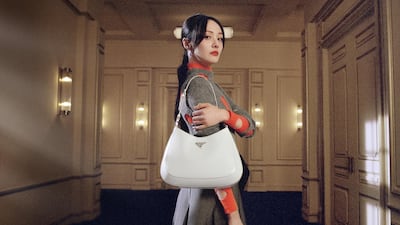
Earlier this year, Prada cut ties with actress Zheng Shuang only a week after she was unveiled as an ambassador when a scandal erupted regarding her alleged abandonment of two children born to surrogates in the US.
Zheng too has been a controversial figure online in China, but Prada has had success partnering with edgier stars in China before. The brand’s affiliation with Cai Xukun, whose 34 million-strong fan base is also part of China’s online “idol wars” has been credited with introducing the brand to a new generation of Chinese consumers.
Though Zheng attracted attention, there were signs that she… she might do something to hurt a brand.
The key difference between the two, according to content manager at China Marketing Insights Yi Kejie, is that Zheng has often been criticised for poor professional performances and erratic public appearances, while Cai is widely-respected for his professional talents.
“Though Zheng attracted attention, there were signs that she… she might do something to hurt a brand,” Yi said.
Celebrity Morality in the Spotlight
Since her short-lived stint as Prada ambassador, Zheng Shuang’s fortunes have fallen further with Xinhua news service reporting she is under investigation for tax evasion.
The probe comes following screenshots that emerged on social media appearing to show Zheng was paid 160 million yuan ($24.6 million) for her role in an upcoming TV series. If it were accurate, the amount would make Zheng one of the highest paid female actors on the planet.
She’s not the first Chinese actress to be investigated by the tax authorities, of course, in 2018 superstar Fan Bingbing was detained for four months and later fined 883 million yuan ($129 million) following a government directive to crack down on corruption in the entertainment industry.
All the campaigns look similar because the celebrities need to present this perfect, morally correct image to their audience.
As Linda Yu points out, the exalted positioning of celebrities in China means they “are making a fortune,” placing them under intense scrutiny from the public, and also China’s Communist government. A step in the wrong moral or political direction means disaster for these stars.
“All the campaigns look similar because the celebrities need to present this perfect, morally correct image to their audience,” she said. “They are constantly being watched and they need to behave.”
This is one reason why more than 50 Chinese celebrities, including Lay Zhang, Dilraba Dilmurat, Liu Yifen and Yang Mi, moved fast to cut ties with brands, including H&M, Nike, Adidas, Burberry, Calvin Klein and Uniqlo, charged with refusing to source cotton from factories in China’s Xinjiang region that allegedly use forced labour.
Moving forward, these celebrities will also have to be increasingly careful about the brands they partner with, especially foreign luxury brands, given the current sensitivities around ostentatious consumption and flaunting wealth leading to social media censorship on major Chinese platforms.
The importance of relevant stakeholders in China’s complex market landscape is drastically different than in other markets, and what is important to each of them is in a constant state of flux.
The key skill for brands and celebrities to develop from here will be deciphering the signals and shifts that are politically and socially significant amid the deafening noise of China’s online world. That won’t be an easy task.
时尚与美容
FASHION & BEAUTY
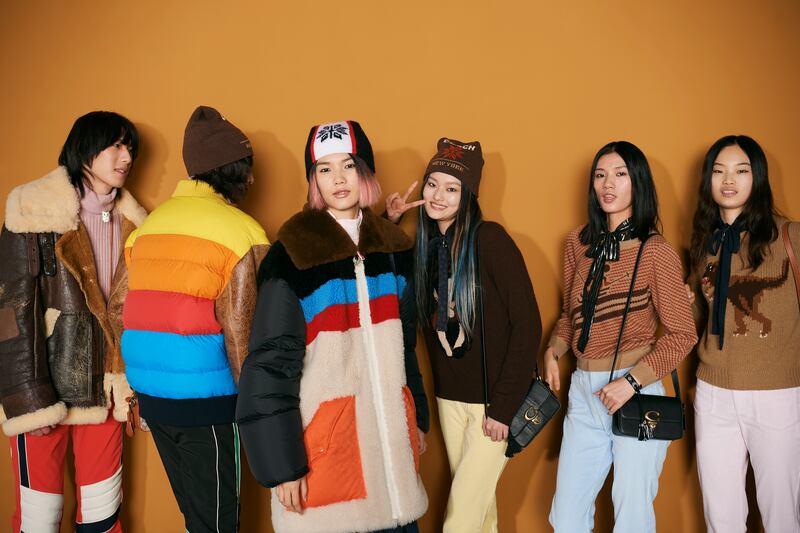
Coach Shows Winter Collection in Shanghai
The historic Shanghai Exhibition Centre was transformed into an American drive-in, complete with an array of vintage cars, which served as the setting for an in-person runway debut for Coach’s newly-renamed “Winter” collection. Alongside the runway show, a new episode of “Coach TV” — the digital fashion concept developed by the brand last year to considerable acclaim — titled “Live in Shanghai” was released. Creative director, Stuart Vevers, described the collection as building on Fall’s story of creature comforts, tactility and softness. The themes of re-emergence and a desire for adventure were represented by retro nylon skiwear with vintage-inspired sporty graphics, juxtaposed with lamé cocktail dresses and blouses finished with dressed up touches of lace and velvet. (BoF)
How Rising Designer Rui Zhou Built Her ‘Elevated Shapewear’ Brand
Rui Zhou’s pastel-coloured, curve-hugging bodysuits look like nothing else in fashion. That’s in part because of their signature cut-outs and pearl-adorned straps, and in part because Zhou — just months before the launch of her namesake brand RUI in 2019 — programmed a knitting machine to perform an obscure technique that has since become unique to her creations. That decision has determined her distinct aesthetic, characterised by sexy knitwear that stretches and pulls across the body, and brought her a number of successes — most recently being the first Chinese woman to be shortlisted for the prestigious LVMH Prize. (BoF)
Hyped C-Beauty Brand Uniskin Raises $15 Million in Series A Round
The Chinese skincare brand has secured Series A financing totalling more than 100 million yuan ($15.66 million). The brand, founded by a medical doctor, focuses on skin data analysis and targeted skincare products for women, with strong emphasis on research and development capabilities and medical expertise. According to its own data, Uniskin’s total sales for 2020 reached 150 million yuan ($23.49 million), and sales in the first quarter of 2021 increased more than 350 percent on the year. (BoF)
科技与创新
TECH & INNOVATION
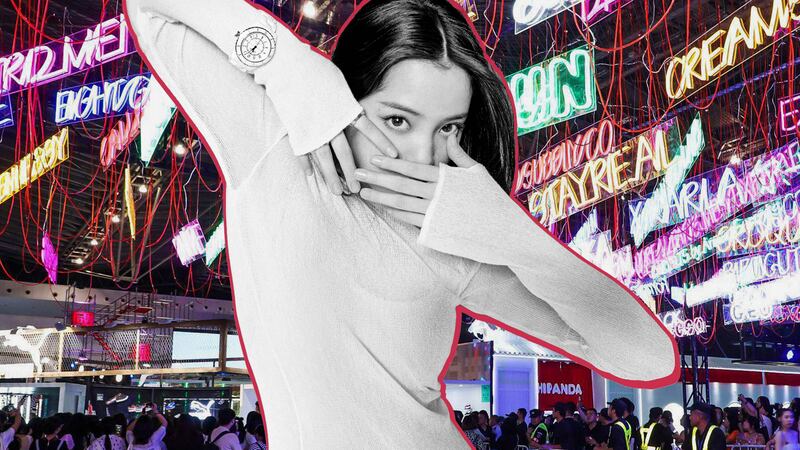
China’s Yoho! Group Facing Financial Strife
Yoho! Group, a Chinese streetwear media and e-tail unicorn is facing escalating financial troubles, according to news reports in China. Anonymous sources from within the group’s management team and several employees said the company has lost 80 percent of its previous workforce as a result of layoffs and unpaid wages. Former employees, who also did not want to be named, confirmed to BoF that the report’s information about the company’s financial situation and staff turnover was an accurate reflection of Yoho! Group’s current predicament. According to public data, Yoho!’s parent company is also currently facing more than 30 civil lawsuits. (BoF)
China’s Mid-Year Shopping Festival in Full Swing
China’s major mid-year e-commerce festival, which was once a one-day event on June 18 celebrating the founding of JD.com, kicked off in late May, with Alibaba (Tmall and Taobao), JD.com, Douyin and Pinduoduo all hyping a month-long shopping extravaganza. According to Alibaba, about 250,000 brands are showcasing themselves in Tmall’s 618 sales this year, 2.5 times last year’s total. A total of 13 million products are on its virtual 618 shelves, 1.4 million of which are new. In addition, Tmall says more than 29,000 overseas brands from 87 markets are participating, with nearly 2,000 overseas brands and nearly 400,000 newly imported products joining for the first time. According JD, sales on its first sales day of this year’s 618 festival surged more than seven times year-on-year. (Global Times)
消费与零售
CONSUMER & RETAIL
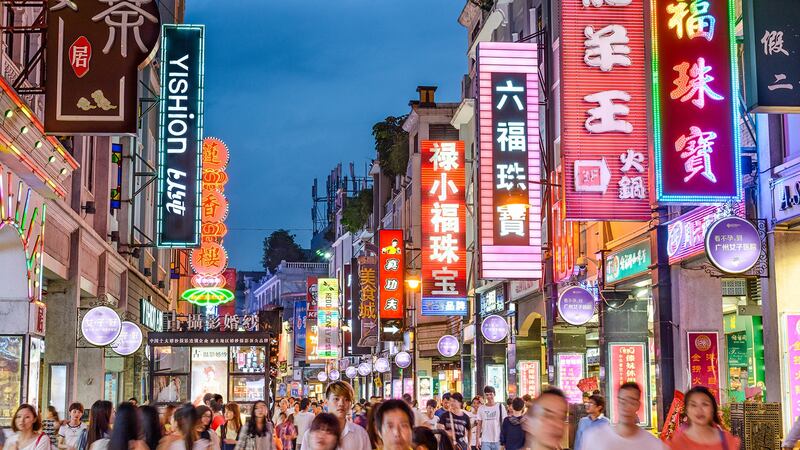
China’s Cautious Consumers Offer Clues for Post-Pandemic World
While China didn’t pump up consumers with stimulus checks, its aggressive control over the virus allowed the economy to quickly re-open and drive real household income growth to 13.7 percent in the first quarter of this year. Yet the consumer recovery has been weaker than expected with economists identifying two major reasons: an unequal distribution of savings from the pandemic and lingering virus worries that’s prompted more conservative habits and has lowered spending on services — subduing an otherwise V-shaped recovery for the world’s second-biggest economy. Evidence from China suggest the recovery could be slow despite the nation’s world-leading 20 million vaccine doses a day with more than 40 percent of the population having had at least one shot. (Bloomberg)
Hong Kong Retail Sales Up 12.1%
The city’s April sales rose off a low comparative base following March’s 20.2 percent year-on-year surge. Though sales between January and April of this year have outpaced 2020′s figures by 8.5 percent, demand is still lagging behind pre-pandemic levels, owing largely to the continued absence of mainland Chinese tourists. Online transactions made up 6.8 percent of overall retail sales, a 27.2 percent boost year-on-year. Hong Kong’s census department estimates that the value of online retail sales during the January-April period was up 53.1 percent compared to the same period last year. (Inside Retail)
政治,经济与社会
POLITICS, ECONOMY, SOCIETY
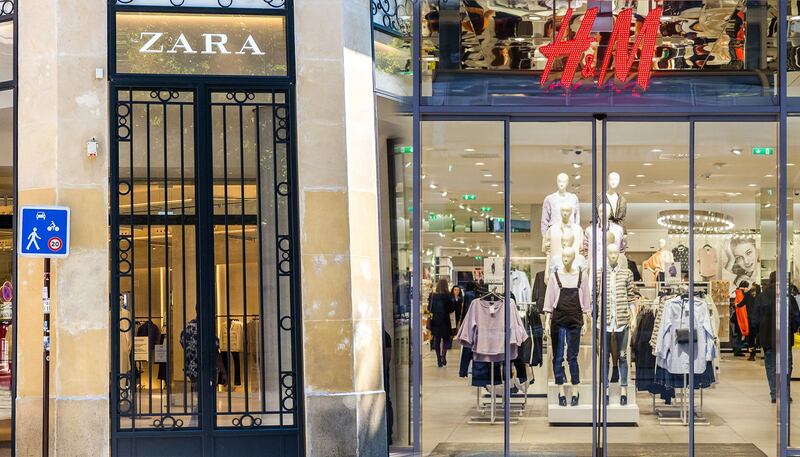
Chinese Customs Accuse Nike, Zara, H&M of Selling Substandard Clothes
Chinese authorities have alleged that a number of Western fashion brands are selling substandard children’s products, including clothing. The announcement marks the latest chapter in the ongoing rift between China’s government and Western fashion brands after the likes of H&M and Nike disavowed the alleged use of forced labour in China’s Xinjiang region, drawing backlash and calls for boycotts in the mainland. In a notice published online, the country’s General Administration of Customs said it confiscated, destroyed or returned products including apparel, footwear and toys found in 81 batches of imported childrenswear, following quality checks conducted between last June and May 2021. (BoF)
China’s Imports Grow at Fastest Pace in Decade as Materials Prices Surge
China’s imports grew at their fastest pace in 10 years in May, fuelled by surging demand for raw materials, although export growth slowed more than expected amid disruptions caused by Covid-19 cases at the country’s major southern ports. While a brisk recovery in developed markets has bolstered demand for Chinese products, a global semiconductor shortage, higher raw material and freight costs, logistics bottlenecks and a strengthening yuan have dimmed the outlook for the world’s largest exporting nation. Major shipping companies warned clients of worsening congestion at Shenzhen’s Yantian port in Guangdong province after the discovery of several cases of Covid-19 among port staff. (Reuters)
China Decoded wants to hear from you. Send tips, suggestions, complaints and compliments to our Shanghai-based Asia Correspondent casey.hall@businessoffashion.com.
With consumers tightening their belts in China, the battle between global fast fashion brands and local high street giants has intensified.
Investors are bracing for a steep slowdown in luxury sales when luxury companies report their first quarter results, reflecting lacklustre Chinese demand.
The French beauty giant’s two latest deals are part of a wider M&A push by global players to capture a larger slice of the China market, targeting buzzy high-end brands that offer products with distinctive Chinese elements.
Post-Covid spend by US tourists in Europe has surged past 2019 levels. Chinese travellers, by contrast, have largely favoured domestic and regional destinations like Hong Kong, Singapore and Japan.